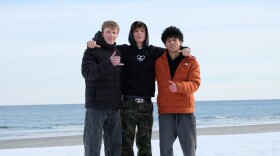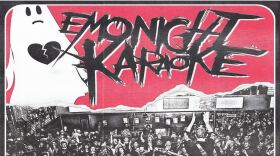Photographers Anastasiia Zazuliak and Patrick Patterson had never met in person before they decided to meet at the Ukrainian border with Poland. But in March they brought their cameras and spent a week there together, documenting the people crossing the border to seek refuge from the war in Ukraine. Their photography is now on display at 3S Artspace in Portsmouth.
Patterson lives on the Seacoast. When the news of the war in Ukraine broke, he started looking for a Ukrainian photographer he could work with and found Zazuliak on Instagram. Zazuliak is from Ukraine, but moved to Poland two years ago where she’s kept up with her photography. After only a few days of messaging back and forth on Instagram the two set their plan in motion.
“I think that there was an apparent sense of honesty and authenticity with [Zazuliak’s] work and her style fits my style,” Patterson said about finding Zazuliak’s work. “I decided that I would reach out and the cosmic alignment happened and we were able to connect and make it work out.”
Zazuliak and Patterson said it was initially difficult to build relationships with refugees coming over the border. Authentic photography demands trust. But as the days went on, they met more people who opened up to them, often with the help of Zazuliak speaking the native language.
“I think photography is about good quality pictures, but also it's about trust and building that bridge,” Zazuliak said. “That's what I'm trying to achieve with my art.”
Patterson made it clear Zazuliak was not on the trip to be a translator for him. She was there as a photographer just as he was. But he said the connections she was able to build as a Ukrainian woman were invaluable — particularly because the vast majority of people crossing the border were women and children.
“I think her natural personality and how she carries herself allows her to connect with just about anyone,” Patterson said. “But in this circumstance, I truly think it opened up the doors to a lot of opportunities.
Many of the photos Zazuliak and Patterson took depict children who are facing what may be the most difficult time in their lives thus far. They said part of their process in building trust was to get involved and help mothers with children in distress.
“You see [a] kid who is crying and you just want to put your camera aside and help [the mother] just to make her kids calm and just to make them feel comfortable,” Zazuliak said. “They don't know what is happening.”
In addition, they provided transportation and helped with lodging for the refugees they worked with. It wasn’t how one might think a traditional journalist would act, but they said that wasn’t what they were trying to do. It was important for them to not just observe, but help.
“I'm happy that we put down our cameras for the majority of the time and assisted people,” Patterson said. “The last thing that I want to do is to walk into a place and treat it like a zoo.”
Zazuliak said she hopes the exhibit will prompt patrons to think differently about how photographers operate.
“I think the most important thing which people will get from this exhibit is [a] different understanding of the role of the photographer,” she said. “[A] photographer is not only a journalist, but also a person who can help others.”
Patterson agreed, adding that he hopes when people view the photos they think more about the differences in the way the global community responds to crises.
“These are women and children that are crossing the border in the thousands each day. [They’re] the same as the people who are currently in the same situation and in northern Ethiopia. These are human beings,” Patterson said. “I would like to bring conversation to the table on how we can be more equitable and how we respond.”
Zazuliak and Patterson’s exhibit, “Dispatches From the Border,” is on display at 3S Artspace from May 6 to 29.

























